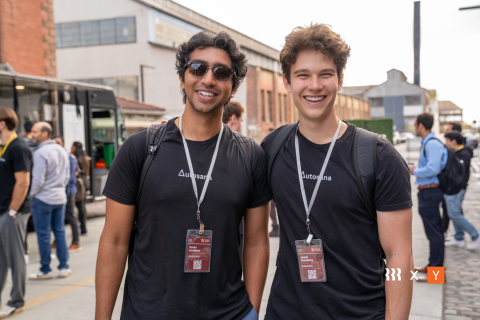Recent News & Accomplishments
2026
Students and employers met at the Adele H. Stamp Student Union for the Spring Career and Internship Fair to discuss internships, full-time roles and workforce expectations in the tech sector.
Students carrying resumes and portfolios moved between employer tables at the Adele H. Stamp Student Union on Monday, February 23, as the University of Maryland Department of Computer Science organized its Spring Career and Internship Fair. The event registered more than 1,000 students seeking internships and employment opportunities, connecting them with recruiters from government agencies, private companies and engineering organizations for in-person conversations about technical skills, workplace expectations and potential career paths. Throughout the afternoon, recruiters spoke with... read more
CS PhD student Kasra Torshizi, mentored by Associate Professor Pratap Tokekar, contributes to AI-driven advances in machine learning, computer vision, and autonomous systems research at UMD’s MATRIX Lab.
University of Maryland (UMD) MATRIX Lab researchers are proving that real-world challenges can be solved with cost-effective research that efficiently uses resources. MATRIX Lab graduate students Ryan Lowe (M.Eng. ’26, Robotics) and Jacob Safeer (M.S. ’26, Aerospace Engineering) and UMD Computer Science PhD student Kasra Torshizi are working with the lab's Director of Test and Evaluation of Autonomous Systems, Dr. Donald "Bucket" Costello, on ways to address various autonomy challenges in the MATRIX Lab's Omni-Domain Autonomous Systems Integration Space (OASIS). Ryan's research investigates... read more
Inside the lab where researchers investigate how bodies, senses and technology work together to shape learning.
At the University of Maryland’s Department of Computer Science, researchers in the Embodied Dynamics Laboratory explore how technology interacts with the human body and mind. Led by Assistant Professor Jun Nishida , the lab studies how perception, movement and sensory experience shape learning and behavior across physical and digital environments. Among its researchers is Ph.D. student Logan Stevens , whose work includes how extended reality technologies can support cognition through carefully designed sensory interaction. This portrait highlights the lab’s research through Stevens’ work,... read more
UMD computer science Professor Heng Huang leads the project’s artificial intelligence and machine learning efforts and plans to build an innovative large genomic language model for Alzheimer’s that will drive drug discovery for the disease.
The National Institutes of Health awarded $12.5 million over five years to support an initiative that uses artificial intelligence (AI) and machine learning (ML) to quickly search vast stores of genomic, biomarker, and cognitive data for patterns that signal risk of Alzheimer’s disease and related forms of dementia. The Phase II award from the National Institute on Aging (NIA) will continue to support a multi-institution team—including principal investigators from the University of Southern California, the University of Pennsylvania, Indiana University, and the University of Maryland—in its... read more
The past decade has seen explosive growth in the collection and use of metagenomic data—genetic material (DNA or RNA) extracted directly from environmental or clinical samples such as soil, water or the human gut. While the surge is fueling breakthroughs in disease tracking, antimicrobial resistance analysis and enzyme discovery, it is also creating significant data-management challenges. Researchers at the University of Maryland are working to address those challenges with support from two grants from the National Institutes of Health totaling $5.1 million. The team is developing open-source... read more
UMD Ph.D. student Geonsun Lee leads “Sensible Agent” project with Google Research to examine proactive AR assistants designed to adapt to real-world context.
When digital assistants first appeared on personal computers, they often waited for users to type a command or click a button. As wearable technologies move closer to everyday use, researchers are asking a different question: What if an assistant could offer help at the right moment without being asked and without interrupting? At the University of Maryland Department of Computer Science, Ph.D. student Geonsun Lee is studying that shift. Lee is the lead author of “ Sensible Agent ,” a project developed in collaboration with Google Research that examines how augmented reality assistants can... read more
In an era where microbiome research reveals significant insights into human health, ecosystems and disease, researchers face a central challenge: making sense of fragmented sequencing data. They must piece together millions of DNA fragments to reconstruct the genomes of thousands of microorganisms in a single sample—a task that demands sophisticated algorithms and novel methods to interpret complex data. Marcus Fedarko , a postdoctoral associate at the University of Maryland Institute for Advanced Computer Studies (UMIACS), is tackling this problem head on. He has returned to the University... read more
Inspired by a college internship, Russell Schwartz (B.S. ’22, mathematics, B.S. ’22, computer science) is taking his passion for mathematics all the way to the moon.
From the time he was a kid growing up in Ellicott City, Maryland, Russell Schwartz (B.S. ’22, mathematics, B.S. ’22, computer science) was obsessed with all things space, from NASA missions to science fiction. “I remember when I was really young, I was super into space and space exploration, that was my big thing,” Schwartz said. “I grew up learning about the Gemini and Apollo missions and the shuttle program and watching shows like Star Trek, and my room was constantly decorated with all kinds of space stuff. It was all just incredibly inspiring.” Schwartz never outgrew that fascination. Now... read more
Department of Computer Science alumni Yuvan Sundrani and Jason Steinberg build Autosana, an AI testing platform accepted into Y Combinator’s 2025 batch.
When mobile & web apps release updates, engineers must ensure new features work properly without disrupting existing ones. That process often involves writing and maintaining detailed test scripts, which frequently break as apps evolve. Fixing those scripts can slow development and consume valuable engineering time. University of Maryland Department of Computer Science alums Yuvan Sundrani (B.S. ’24, computer science; B.S. ’24, information science) and Jason Steinberg (B.S. ’24, computer science; B.S. ’24, general business) saw those challenges firsthand. In 2025, they launched Autosana... read more
Modern cloud services rely on telemetry—the collection, transmission, and analysis of data—to monitor and ensure that systems are healthy, performant and reliable. But gathering and analyzing this data at scale is often expensive and slow, forcing engineers to balance trade-offs between performance, cost and accuracy. Zeying Zhu, a fifth-year computer science doctoral student at the University of Maryland, is working to overcome these limitations. “Modern telemetry systems should be high-performance, scalable and inexpensive, but today’s solutions struggle to achieve all three at once,” she... read more









